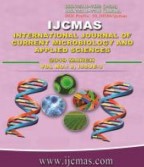


 National Academy of Agricultural Sciences (NAAS)
National Academy of Agricultural Sciences (NAAS)

|
PRINT ISSN : 2319-7692
Online ISSN : 2319-7706 Issues : 12 per year Publisher : Excellent Publishers Email : editorijcmas@gmail.com / submit@ijcmas.com Editor-in-chief: Dr.M.Prakash Index Copernicus ICV 2018: 95.39 NAAS RATING 2020: 5.38 |
Bioethanol from lignocellulosic substrates could be a key alternative and sustainable fuel because of diminishing fossil fuel reserves and increased concerns over environmental pollution. Therefore, recent focus has made on cheaply available lignocellulosic substrate like bamboo. Production of bioethanol using bamboo as feedstock is gaining importance as of relatively higher growth rate and their abundant and sustainable availability in the tropics. In this study, a perennial woody grass bamboo was exploited for the production of bioethanol using the simultaneous saccharification and fermentation process with cellulase enzyme and a thermotolerant yeast Kluyveromyces marxianus TY16 for efficient conversion. The bamboo was found to contain maximum cellulose content of 49.30 %. SEM and FTIR analysis of the acid treated and untreated substrate showed the difference in the structural changes. Under the optimum conditions of SSF, maximum ethanol concentration of 26.04 gl-1 was achieved from the bamboo substrate. Thus, it showed that the bamboo biomass conversion using the SSF process has the good potential for ethanol production industries.
 |
 |
 |
 |
 |